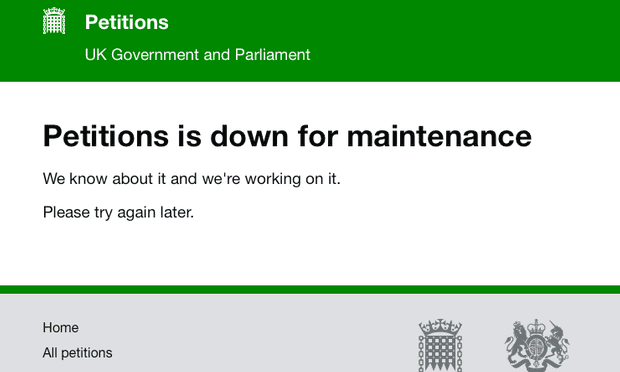A petition to cancel Brexit and remain in the European Union crashed the U.K. government website on Thursday.

The U.K. government site includes the option to start a petition to alert lawmakers to an issue, with a promise that 10,000 signatures will warrant an official response and 100,000 signatures will compel a debate in Parliament. So far, according to the site, 308 petitions have received a response from government and 55 petitions have been debated in the House of Commons.
Almost two million people have signed the petition, started by the British woman Margaret Anne Georgiadou, which pushes to revoke the triggering of Article 50 — the EU treaty’s exit clause.

The U.K. government and Prime Minister Theresa May have spent the last two years attempting to set terms for leaving the EU, with little success. This standstill is largely because May and parliament cannot agree on a plan of action.
Following several delays, May asked the European Council this past week to extend the Article 50 period through to June 30 rather than the March 29 deadline. European Council President Donald Tusk said on Thursday that all Brexit options were still open for Britain until April 12, after a summit of EU leaders agreed to Prime Minister Theresa May’s request to delay the leave date from March 29.
WATCH: Theresa May at Brussels summit to put Brexit delay to EU leaders

The petition states; “The government repeatedly claims exiting the EU is ‘the will of the people’. We need to put a stop to this claim by proving the strength of public support now, for remaining in the EU. A People’s Vote may not happen — so vote now.”

Get breaking National news
Georgiadou said via Twitter a week ago, “I simply want a large number to slap in the government’s face.”
The rate of signatures soared on Wednesday, Georgiadou told NPR, when it was around 200,000 signatures. The momentum continued on Thursday when, according to the Petitions Committee, the site was not equipped to handle so many signatures.
The committee added that nearly 100,000 people were viewing the petition at the same time and almost 2,000 people were adding signatures every minute.
The site went down at around 9 a.m. Thursday, and was up again by 9:40 a.m. However, it went down again several times before the late morning.
Despite the wild popularity of the petition, she said she “will not countenance” revoking Article 50.
A spokesperson for the prime minister told the Guardian that May worried that failing to separate the U.K. from the European Union would cause “potentially irreparable damage to public trust.”
The representative continued, “the prime minister has long been clear that failing to deliver on the referendum result would be a failure of our democracy and something she couldn’t countenance.”
WATCH: British PM wants Brexit postponed to June 30

Several celebrities have expressed their support for the poll, including Hugh Grant, Jennifer Saunders and Brian Cox. In addition, politicians are beginning to speak out against the Brexit deadline.
Chief minister of Gibraltar, Fabian Picardo, told Sky News that “if on Tuesday, MPs do not back the withdrawal agreement, then the only way for the U.K. to take back control of the Brexit process is to revoke the article 50 notification.”
Tom Forth, head o the Open Data Institute Leeds (ODI), said in a tweet that while the number of signatures may be massive and continues to grow, it’s important to look at where the signatures are coming from.
“The best way to see where the “Revoke Article 50 and remain in the EU” petition is being signed is on the @ODILeeds hexmap viewer. A clear pattern, extremely concentrated in just a few places, and a very strong correlation with places that voted Remain.”
The petition map provided on the official site largely backs up this analysis, with most of the signatures coming from London, Cambridge and Manchester with the Scottish regions of Glasgow and Edinburgh not far behind.
In the 2016 referendum, based on data compiled by the BBC, London, Cambridge and Edinburgh all voted to stay by significant margins. The results were fairly consistent with about 75 per cent of voters selecting “Remain” in each region. In Manchester and Glasgow, the “remain” votes are slightly less robust at about 60 per cent in the former and 66 per cent in the latter.
— With a file from Reuters.








Comments
Want to discuss? Please read our Commenting Policy first.